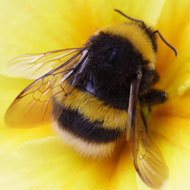Bumblebees flourish in urban areas, study finds

Urban bumblebees not only produce more offspring that those in rural areas, but they also have more food supplies.
Bumblebees flourish in towns and cities more than those in the countryside, according to new research.
The study, led by the University of London, found that urban bumblebees not only produce more offspring that those in rural areas, but they also have more food supplies, encounter fewer parasite invasions and live much longer.
‘Our results show a link between urbanization and bumblebee colony reproductive success, supporting the theory that urban areas provide a refuge for pollinator populations in an otherwise barren agricultural landscape,’ the authors write.
In the study, researchers reared colonies from wild-caught queens and placed them at 38 sites across London, its suburbs and the surrounding agricultural land.
The team then visited the sites once a week at night to record the number of worker bees, check whether the queen was dead or alive and analyse the presence of nectar and pollen.
The researchers also checked for the presence of Bombus vestals - the cuckoo bumblebee - which they removed to prevent the death of the queen, and removed any males or gynes, simulating their natural tendency to leave the nest.
After 10 weeks, the colonies diminished and the team proceeded to examine each site using aerial photographs. They found that the sites fell into three clusters - agricultural, village and city, and that each type of land was linked to the success of the colony.
'Our findings suggest that abundance and diversity differences found in previous studies may be driven by a direct impact of land use on fitness, rather than migration between land-use types, and support the growing evidence that some types of agricultural land represent a barren landscape for pollinators,” the authors conclude.
'Given that agricultural land is the most common primary land use in Europe, our finding that urban areas are linked to higher reproductive success suggests that developed land may provide a refuge for bumblebee populations within a landscape dominated by intensive farming.'
The study, Lower bumblebee colony reproductive success in agricultural compared with urban environments, is published in Proceedings of the Royal Society B.



 The Veterinary Medicines Directorate (VMD) is inviting applications from veterinary students to attend a one-week extramural studies (EMS) placement in July 2026.
The Veterinary Medicines Directorate (VMD) is inviting applications from veterinary students to attend a one-week extramural studies (EMS) placement in July 2026.